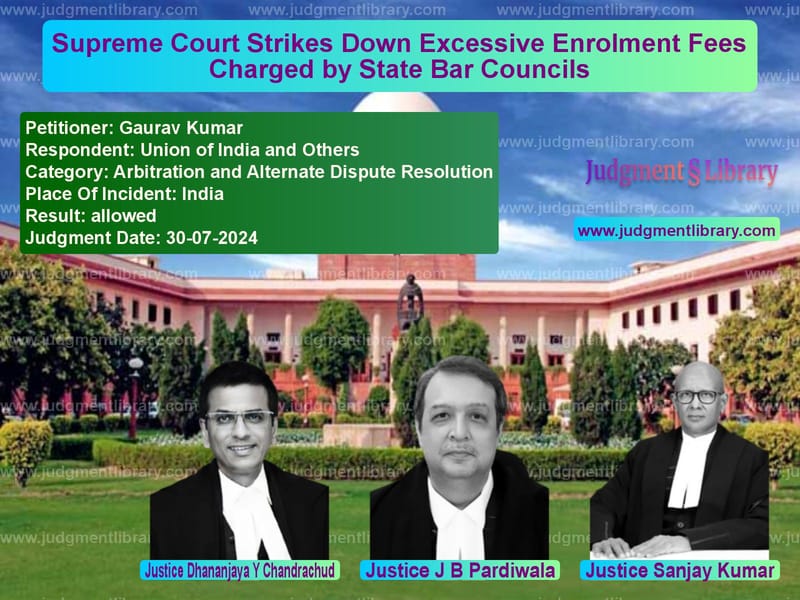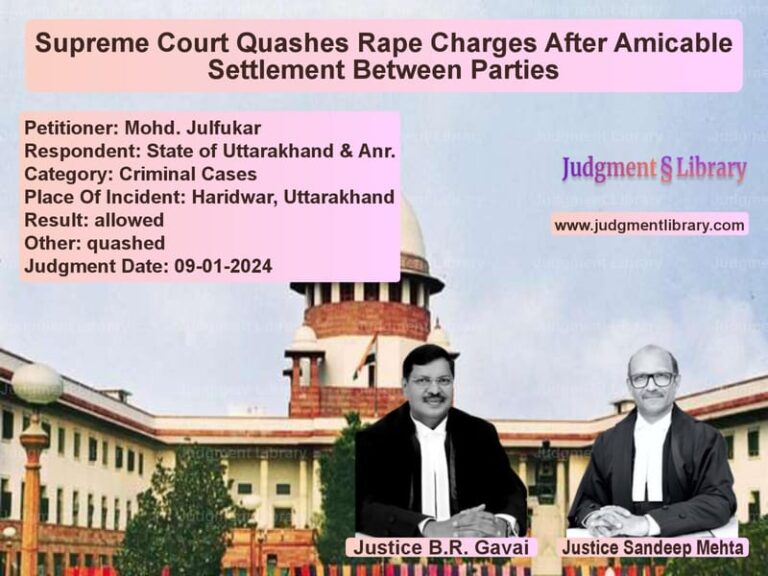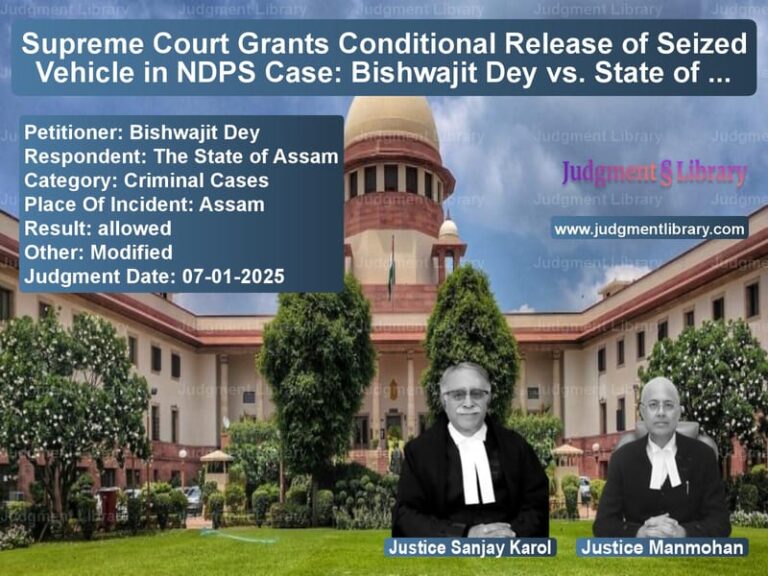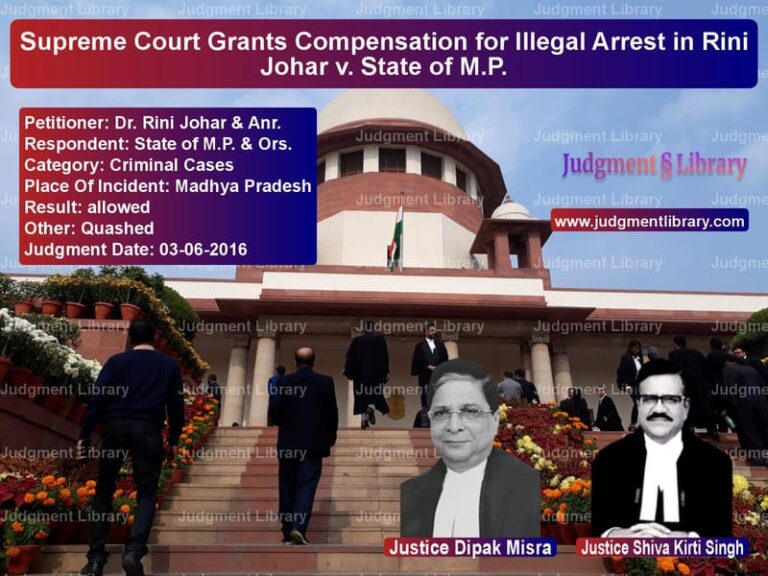Supreme Court Strikes Down Excessive Enrolment Fees Charged by State Bar Councils
The Supreme Court of India has delivered a landmark judgment addressing the issue of excessive enrolment fees charged by State Bar Councils (SBCs). The case, filed under Article 32 of the Constitution, was brought by petitioner Gaurav Kumar, challenging the exorbitant fees levied by SBCs at the time of enrolment beyond the statutory limit prescribed under Section 24(1)(f) of the Advocates Act, 1961. This judgment is a significant step in ensuring fairness and accessibility in the legal profession, especially for young law graduates from economically weaker sections.
Background of the Case
The Advocates Act, 1961, was enacted to consolidate and regulate the legal profession in India. It prescribes the eligibility criteria for enrolment as an advocate and the fees to be paid at the time of enrolment. Section 24(1)(f) specifically states that the enrolment fee for general category candidates shall be Rs. 750 and for Scheduled Castes (SC) and Scheduled Tribes (ST) candidates, Rs. 125. However, over the years, various SBCs have been charging significantly higher amounts under different heads, such as library fees, processing fees, welfare contributions, training fees, and administrative costs.
These fees vary from state to state, with some SBCs charging as much as Rs. 42,000 for enrolment. This discrepancy led to concerns that such charges were creating economic barriers to entry into the legal profession, particularly for students from financially weaker backgrounds. The petitioner, Gaurav Kumar, argued that these excessive fees violated the statutory mandate of the Advocates Act and fundamental rights under Articles 14 and 19(1)(g) of the Constitution.
Read also: https://judgmentlibrary.com/arbitration-clause-in-insurance-disputes-key-legal-insights/
Issues Before the Court
The petitions raised two key issues:
- Whether the enrolment fees charged by SBCs were in violation of Section 24(1)(f) of the Advocates Act.
- Whether SBCs could impose additional fees under various categories as a pre-condition for enrolment.
Arguments by the Petitioner
Petitioner-in-person, Gaurav Kumar, made the following submissions:
- Section 24(1)(f) prescribes the enrolment fee, and SBCs do not have the authority to charge beyond this limit.
- The rule-making power granted to SBCs under Sections 15 and 28 cannot override explicit statutory provisions.
- Additional charges imposed by SBCs create an economic burden on young lawyers and violate Article 19(1)(g), which guarantees the right to practice any profession.
- The excessive fees are arbitrary and violate Article 14, as they are not uniformly applied across states and lack a rational basis.
- The Advocates’ Welfare Fund Act, 2001, already provides for welfare measures, and charging additional fees at the time of enrolment is unnecessary and unjustified.
Response of the Bar Council of India
Senior counsel Manan Kumar Mishra, appearing for the Bar Council of India (BCI), defended the imposition of additional fees, arguing that:
- The fees prescribed under Section 24(1)(f) were last revised in 1993 and are inadequate to meet the current financial needs of SBCs.
- SBCs do not receive government funding and rely on enrolment fees for their administrative expenses, legal aid initiatives, and welfare programs.
- The fees charged are linked to the services provided during the enrolment process, such as identity verification, data processing, and issuance of certificates.
- The BCI has drafted Uniform Rules to standardize enrolment fees across all states.
- Given the financial burden on SBCs, the Supreme Court should exercise its power under Article 142 to ensure a fair and uniform fee structure.
Supreme Court’s Observations
The Supreme Court examined the legislative framework, historical context, and impact of the fees on aspiring advocates. Key observations included:
- The Advocates Act is a comprehensive code governing enrolment, and SBCs must adhere strictly to its provisions.
- The rule-making power under Sections 15 and 28 cannot be used to levy additional charges at the time of enrolment.
- The phrase “in respect of the enrolment” under Section 24(1)(f) implies that all fees charged as a pre-condition to enrolment are part of the enrolment fee and cannot exceed the statutory limit.
- Charging exorbitant fees violates Article 14, as it discriminates against economically weaker candidates by creating financial barriers.
- The fees imposed are an unreasonable restriction under Article 19(1)(g) and hinder access to the legal profession.
Financial Implications and Alternative Solutions
The Court acknowledged the financial challenges faced by SBCs but emphasized that enrolment fees should not be the primary revenue source. It suggested alternative measures, including:
- Charging periodic fees from already enrolled advocates rather than burdening fresh graduates.
- Utilizing funds collected under the Advocates’ Welfare Fund Act, 2001, which mandates a contribution from every enrolled advocate.
- Introducing voluntary contributions or structured payment models for advocate welfare initiatives.
Final Verdict
The Supreme Court ruled:
- SBCs cannot charge enrolment fees beyond Rs. 750 for general candidates and Rs. 125 for SC/ST candidates.
- All other miscellaneous fees collected at the time of enrolment are illegal and must be discontinued.
- The judgment will have prospective effect, meaning that SBCs are not required to refund excess fees already collected.
With this decision, the Supreme Court has reinforced the principle of fairness and accessibility in the legal profession. By ensuring that enrolment fees remain within statutory limits, the Court has upheld the rights of aspiring advocates and prevented economic barriers that could hinder their entry into the profession.
Petitioner Name: Gaurav Kumar.Respondent Name: Union of India and Others.Judgment By: Justice Dhananjaya Y Chandrachud, Justice J B Pardiwala, Justice Sanjay Kumar.Place Of Incident: India.Judgment Date: 30-07-2024.
Don’t miss out on the full details! Download the complete judgment in PDF format below and gain valuable insights instantly!
Download Judgment: gaurav-kumar-vs-union-of-india-and-o-supreme-court-of-india-judgment-dated-30-07-2024.pdf
Directly Download Judgment: Directly download this Judgment
See all petitions in Arbitration Awards
See all petitions in Dispute Resolution Mechanisms
See all petitions in Institutional Arbitration
See all petitions in Legal Malpractice
See all petitions in Contempt Of Court cases
See all petitions in Judgment by Dhananjaya Y Chandrachud
See all petitions in Judgment by J.B. Pardiwala
See all petitions in Judgment by Sanjay Kumar
See all petitions in allowed
See all petitions in supreme court of India judgments July 2024
See all petitions in 2024 judgments
See all posts in Arbitration and Alternate Dispute Resolution Category
See all allowed petitions in Arbitration and Alternate Dispute Resolution Category
See all Dismissed petitions in Arbitration and Alternate Dispute Resolution Category
See all partially allowed petitions in Arbitration and Alternate Dispute Resolution Category







